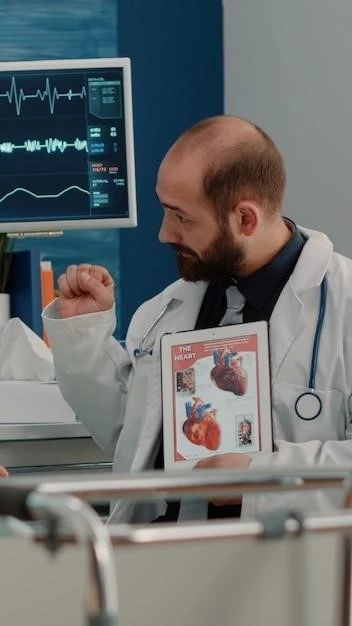Cardiomyopathy can be caused by various factors, including high blood pressure, heart valve problems, viral infections, and excessive alcohol consumption. Understanding the underlying causes is crucial for effective management and treatment. Stay informed!
Causes of Cardiomyopathy
Cardiomyopathy can be caused by various factors that affect the heart muscle’s ability to pump blood effectively. Common causes include⁚
- Genetics⁚ Inherited genetic mutations can lead to cardiomyopathy.
- Coronary Artery Disease⁚ Blocked arteries reduce blood flow to the heart muscle.
- Infections⁚ Viral infections like myocarditis can damage the heart muscle.
- Chemotherapy⁚ Certain cancer treatments, like anthracyclines, can be cardiotoxic.
- Autoimmune Conditions⁚ Conditions like lupus can lead to inflammation in the heart.
- Chronic Alcohol Abuse⁚ Excessive alcohol consumption can weaken the heart muscle over time.
Recognizing the underlying causes of cardiomyopathy is essential for early detection and appropriate treatment. If you have risk factors or experience symptoms, consult a healthcare professional for a thorough evaluation.
Symptoms of Anthracycline-induced Cardiomyopathy
Anthracycline-induced cardiomyopathy can manifest with various symptoms that indicate heart muscle damage. It is important to be aware of these signs to seek prompt medical attention⁚
- Shortness of Breath⁚ Difficulty breathing, especially during physical activity or when lying down.
- Fatigue⁚ Persistent tiredness or weakness that interferes with daily activities.
- Swelling⁚ Swollen legs, ankles, or abdomen due to fluid retention.
- Irregular Heartbeat⁚ Palpitations or rapid, irregular heart rhythms.
- Chest Pain⁚ Discomfort, pressure, or pain in the chest, which may radiate to the arm, neck, or back.
- Dizziness or Fainting⁚ Feeling lightheaded, dizzy, or passing out;
If you are undergoing cancer treatment with anthracyclines and experience any of these symptoms, do not ignore them. Contact your healthcare provider immediately for evaluation and appropriate management. Regular monitoring can help detect cardiomyopathy early and prevent complications.
Treatment for Anthracycline Cardiomyopathy
Managing anthracycline-induced cardiomyopathy involves a comprehensive approach to support heart function and improve quality of life. Treatment strategies may include⁚
- Medications⁚ Prescription drugs such as ACE inhibitors, beta-blockers, or diuretics can help manage symptoms and improve heart function.
- Cardiac Rehabilitation⁚ Enrolling in a cardiac rehab program can provide structured exercise, education, and support for heart health.
- Dietary Changes⁚ Following a heart-healthy diet low in sodium and saturated fats can reduce strain on the heart.
- Lifestyle Modifications⁚ Quitting smoking, limiting alcohol intake, and managing stress are crucial for heart health.
- Monitoring and Follow-up⁚ Regular check-ups with a cardiologist and oncologist can track heart function and adjust treatment as needed.
Collaborate closely with your healthcare team to develop a personalized treatment plan tailored to your needs. By actively participating in your care and making positive lifestyle choices, you can enhance your heart’s well-being and overall health.
Prevention of Heart Damage from Chemotherapy
Protecting your heart during chemotherapy is vital to minimize the risk of developing cardiomyopathy and other cardiac complications. Consider the following preventive measures⁚
- Cardiac Monitoring⁚ Regular heart function tests before, during, and after treatment can help detect any early signs of heart damage.
- Heart-Healthy Lifestyle⁚ Maintaining a healthy weight, exercising regularly, and eating a balanced diet can support heart health;
- Close Communication⁚ Keep open communication with your healthcare team about any existing heart conditions or concerns.
- Alternative Treatments⁚ Explore alternative chemotherapy options that may be less cardiotoxic.
- Protective Medications⁚ Some medications can help protect the heart during chemotherapy; discuss with your oncologist.
By taking a proactive approach to safeguarding your heart health during chemotherapy, you can reduce the risk of long-term cardiac complications and maintain your overall well-being. Prioritize your heart’s health throughout your cancer treatment journey.
Anthracycline Cardiotoxicity Mechanism
Anthracyclines are chemotherapy drugs widely used in cancer treatment, but their effectiveness can come with the risk of cardiotoxicity, leading to heart damage. The mechanisms of anthracycline cardiotoxicity involve⁚
- Oxidative Stress⁚ Anthracyclines generate free radicals in the heart cells, causing oxidative damage.
- Disruption of Cardiac Cells⁚ These drugs can interfere with the function of cardiomyocytes, the heart muscle cells.
- Inflammatory Response⁚ Anthracyclines trigger an inflammatory process in the heart tissue, contributing to damage.
- Apoptosis⁚ Cardiomyocyte cell death can be induced by anthracyclines, weakening the heart muscle over time.
Understanding the mechanisms of anthracycline cardiotoxicity is essential for developing strategies to mitigate these effects and protect the heart during cancer treatment. Close monitoring and tailored interventions can help reduce the risk of cardiomyopathy and preserve heart function.
Managing Cardiac Side Effects of Cancer Treatment
Effective management of cardiac side effects during cancer treatment is crucial for maintaining heart health and overall well-being. Here are key strategies to help manage these side effects⁚
- Regular Monitoring⁚ Consistent monitoring of heart function through tests and evaluations can detect any cardiac changes early.
- Medication Adherence⁚ Taking prescribed heart medications as directed by your healthcare provider is essential for managing side effects.
- Healthy Lifestyle⁚ Adopting a heart-healthy lifestyle with balanced nutrition, regular exercise, and stress management can support cardiac health.
- Communication⁚ Openly communicate with your healthcare team about any symptoms or concerns related to heart health.
- Support Services⁚ Engage in support groups, counseling, or cardiac rehabilitation programs to cope with the emotional impact of cardiac side effects.

By actively participating in managing cardiac side effects, you can optimize your heart health and enhance your quality of life during and after cancer treatment. Prioritize your heart’s well-being as part of your overall cancer care plan.
Exercise Guidelines for Cardiomyopathy Patients
Physical activity is important for overall health, including for individuals with cardiomyopathy. However, it’s crucial for patients with cardiomyopathy to follow specific exercise guidelines to ensure safety and effectiveness. Here are some tailored exercise recommendations⁚
- Consult Your Healthcare Provider⁚ Before starting any exercise program, consult your healthcare provider to determine the most suitable activities for your condition.
- Low to Moderate Intensity⁚ Engage in low to moderate-intensity exercises such as walking, swimming, or cycling to improve cardiovascular fitness without excessive strain on the heart.
- Monitoring Symptoms⁚ Pay attention to how your body responds during exercise. Stop immediately and seek medical advice if you experience chest pain, severe shortness of breath, or dizziness.
- Regularity⁚ Aim for regular, consistent exercise sessions to gradually build endurance and strength over time.
- Cardiac Rehabilitation⁚ Consider enrolling in a cardiac rehab program that offers supervised exercise sessions and education on heart-healthy living.
By following these exercise guidelines tailored to your condition, you can safely improve your physical health, manage symptoms, and enhance your overall well-being while living with cardiomyopathy.
Research on Anthracycline-induced Cardiomyopathy
Research on anthracycline-induced cardiomyopathy plays a vital role in understanding the mechanisms, risk factors, and potential treatments for this condition. Ongoing studies focus on various aspects of anthracycline cardiotoxicity, including⁚
- Biomarkers⁚ Identifying biomarkers that can predict the risk of cardiomyopathy development in cancer patients undergoing anthracycline therapy;
- Preventive Strategies⁚ Investigating preventive measures, such as cardioprotective medications or lifestyle interventions, to reduce the incidence of anthracycline-induced heart damage.
- Treatment Innovations⁚ Developing novel treatment approaches that target the specific mechanisms of anthracycline cardiotoxicity to improve outcomes and quality of life for affected individuals.
- Long-Term Monitoring⁚ Studying long-term outcomes in patients who have experienced anthracycline-induced cardiomyopathy to optimize follow-up care and survivorship.
By supporting and participating in research initiatives on anthracycline-induced cardiomyopathy, healthcare professionals and patients contribute to advancing knowledge and enhancing care for individuals at risk of or affected by this condition. Stay informed about the latest research findings to make well-informed decisions regarding your heart health.
